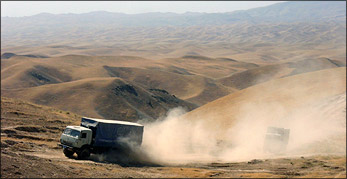Cross-country journey brings displaced Afghans home
Cross-country journey brings displaced Afghans home

KANDAHAR, Afghanistan, June 9 (UNHCR) - For three years, Zhare Dasht camp, located on a sun-baked plain in southern Afghanistan, has sheltered nearly 50,000 internally displaced people. Many have now decided it is time to return home.
The camp was built by the UN refugee agency, with the support of donors and partner agencies, in early 2002 to house Afghans who had been forced to leave their homes elsewhere in the country. Many were Pashtuns from the north who feared persecution following the defeat of the unpopular - and largely Pashtun - Taliban.
Zhare Dasht also became home to thousands of farmers left destitute by years of drought; a drought which also left many of Afghanistan's nomadic Kuchis unable to continue their traditional way of life.
Within the camp, UNHCR, with the Afghan government, provides residents with access to water, sanitation, school and medical facilities.
But the pull of home is still strong. Already, more families have returned home this summer than in all of 2004.
Mohammed Hasham and his family have lived in Zhare Dasht since it was established. He is joining a return operation organized by the UN refugee agency and the International Organization for Migration (IOM) that is assisting more than 40 families to return to their homes in northern Faryab province.
"We are happy that we are heading towards our homes after three years of living in Zhare Dasht," says Mohammed as he loads his belongings onto a truck provided by UNHCR. "We are grateful for the help we have received here over the past three years, but we have heard that the situation in the north has improved and we want to return to our own homes."
The return from Zhare Dasht is supported by the Afghan government. That these families now feel they can go home is seen as further evidence of the country's regeneration.
There are nearly 125,000 internally displaced people living in camps and settlements in southern Afghanistan. Not all of them feel they can return to their homes, but for those who can, the decision to leave is one that is carefully considered.
Ousseni Compaore is responsible for UNHCR activities in southern Afghanistan. He believes that many of the families are returning home now in order to play a part in the rebuilding of their country, particularly with national assembly elections due to be held in September.
"Contributing to national reconciliation and Afghan reconstruction is certainly a factor in their decision to return," says Compaore. "Many of these displaced people want to participate in the upcoming elections and they know they can only do that by returning to their places or origin."
The six-day journey home takes the families halfway around the country, on roads that in many places are only passable in four-wheel-drive vehicles. The cost of the trucks and buses that make up the convoy is covered by UNHCR and its partners.
In the western city of Herat - the mid-way point of the journey - the families receive a package of assistance ranging from tools to food supplies, designed to help them settle back in their home areas.
"We have included a range of items that are designed to help the displaced people to reintegrate into their original communities and to be able to look after themselves during those first weeks," says Baqi Pakdel of IOM.
From Herat onwards, the roads become deeply rutted tracks. Imposing, Russian-made trucks have been hired for the second half of the journey. The families ride among their possessions, the buses having been left behind.
When the convoy crosses into the north-western province of Badghis, the returnees start to feel they're back in familiar surroundings.
"We feel glad to have reached our home area without any problems. Our hope now is that we will be able to live peacefully in our homes far from the rule of the gun, where we can live in dignity and without fear," says an elderly man.
Security is on many people's minds as the convoy moves through isolated parts of the country. But in the five days since they left Zhare Dasht, they've experienced nothing more serious than a flat tire.
For many of the younger members of the group, this journey is not a return but a new start in a part of Afghanistan they've never seen before.
"I was born in Pakistan, but now I'm returning to my country and to my uncle," says a young boy, clearly excited to see his new home.
In the north and throughout Afghanistan, UNHCR is working to help all Afghans who fled their homes - either to camps inside Afghanistan or to other countries - to settle back into their communities.
"UNHCR has a number of projects in Faryab province," says Basir Sediqyar of UNHCR's Maymana office. "These include shelter assistance, access to water, and co-existence programmes. They are all designed to help returnees to reintegrate into their areas of origin."
The final day of the journey begins at dawn at an IOM transit centre in the village of Bala Murghab, close to their final destination.
The assistance supplies received in Herat have been unloaded and divided among the families. From here the convoy separates into three smaller groups as the members approach their homes.

By late afternoon, Mohammed Hasham has arrived in the village he left more than four years ago. His house, though damaged, is still standing. With the materials he's brought with him from Zhare Dasht and the assistance he's received, he will soon resume the life he left behind.
"We're grateful for the help we've received," he says as his belongings are unloaded from the truck for last time. "Now we want to return to our old lives, working as farmers and living peacefully."
By Tim Irwin
UNHCR Afghanistan








